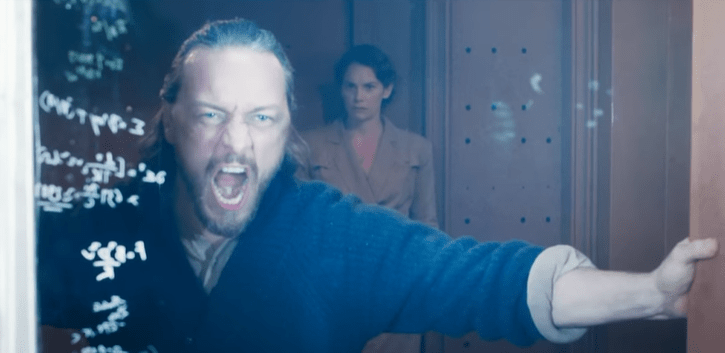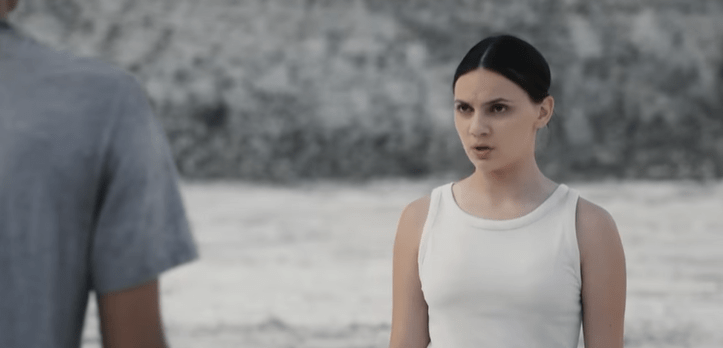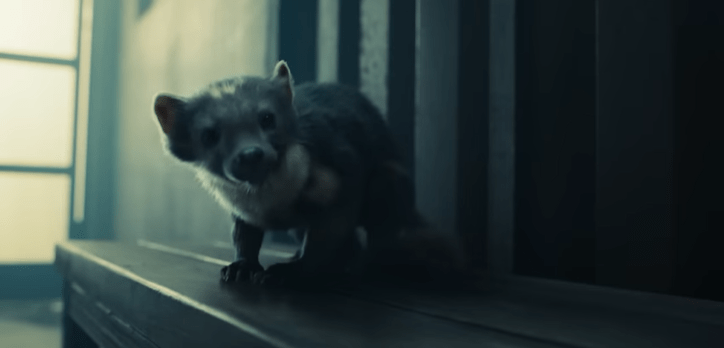His Dark Materials 3×03 & 3×04 Review: “The Intention Craft” & “Lyra and Her Death”

His Dark Materials is barreling its way through its third and final season. Last week’s episodes left us with a doozy of a cliffhanger, with Marisa seemingly at the mercy of the Magisterium while Lyra and Will escape through the open gateway. Unfortunately, with the Knife now broken, there is little they can do to get away. “The Intention Craft” and “Lyra and Her Death” continue the story, with some seriously heavy emotional beats and philosophical discussion that most children’s media tends to shy away from.
“The Intention Craft” begins with the long-awaited reunion between Asriel and Marisa. Naturally, it’s far from a happy one, considering Asriel has Marisa chained up and at least a quarter of his council wants her dead. The scenes between these two were particularly compelling, as we haven’t gotten to see them interact much – and not at all since season 1. James McAvoy and Ruth Wilson absolutely owned those scenes. These are two people who are so full of pride and self-loathing that they resent each other because they recognize their faults in each other.
Their feelings for Lyra are a sore point for both of them. Marisa is disgusted that Asriel seems to have little regard for her, yet Asriel doesn’t buy Marisa’s doting mother act considering that she wasn’t in Lyra’s life until recently. Marisa admitted that she was humiliated and ashamed of Lyra because of how the circumstances of her birth ruined Marisa’s hard-fought reputation. When you look at the misogyny of their world, it’s understandable why she felt that way. It’s not excusable, but it’s understandable.
I got the sense, during their argument, that Asriel was so dismissive of Lyra because Marisa essentially abandoned her. These two are so damaged and self-involved that I can’t imagine any real love existed between them, but one does wonder if Marisa’s less-than-enthusiastic reaction is what led Asriel to be so resentful of Lyra. Then again, both of them seem to believe they were doing their best to protect Lyra. Maybe that’s the best that they can do.
Asriel and Marisa’s scenes also provide some great theological insights. When Asriel reveals to Marisa the truth that he’s learned, she of course does not believe him. Then he shows her the Angel. It’s unclear whether or not this makes her believe him. After all, she would have already believed in Angels; this doesn’t mean that what Asriel has said about the Authority is true.
These two scenes provided some great moments that I felt really hammer home the intent of His Dark Materials as a story. The idea that God the Authority is a lie suddenly calls into question any and all actions committed in His name. Those who did unspeakable things because they believed they were following some higher purpose are now faced with the knowledge that they did those things for nothing. There is a great bit of metaphor later in the episode, when the two of them leave their Daemons (their souls) outside while they destroy the Angel.
But also, I genuinely loved the moment where Marisa first sees the Angel. She says, “He’s beautiful,” in reverence and awe. And Asriel grunts, “Everyone’s beautiful,” because everyone is. The Angel isn’t special because he’s an Angel.

Meanwhile, Lyra and Will have reunited and are almost immediately fighting. Both of them have serious drives to atone for people that they believe they’ve wronged. Lyra’s dreams of Roger have her desperately wanting to find him in what she now knows to be the Land of the Dead. But Will is desperate to keep his word to his dying father.
First, though, they have to fix the Knife. Luckily, Iorek was lingering in the area where they disappeared through the gateway. If anyone can fix the Knife, it’s Iorek and his skill with forging. I will say that I was disappointed in the forging scene. I’m sure it would have been too CGI-heavy to actually show Iorek forging the Knife, but just seeing brief flashes was not enough.
It is important, though, that when Iorek told Will to focus on what’s important, he thinks of Lyra. It isn’t his father or his mother that holds his will, it’s Lyra. I think it’s because Lyra is the one championing him. When he worries that he won’t be strong enough to do what’s needed because he faltered when it mattered, Lyra reminds him that it’s because he’s a good person. Good people doubt their actions, because they don’t know which path is the right one. That’s ultimately why he decides to follow her to the Land of the Dead.
Their journey to the Land of the Dead takes up much of “Lyra and Her Death”. I found it interesting that Pan is the only one who is uneasy during their trip. Will keeps telling Lyra they can turn back, but he still follows without hesitation. Pan has to be continually reassured and still doesn’t like it.
This episode is insanely poetic. “From the moment we’re born, we begin to die.” It’s one of those quotes that has always made me depressed, but it’s true. The people that Will and Lyra meet at the entrance to the Land of the Dead tell them that everyone has their Death alongside them for their entire lives, until it’s time for them to die. It’s only when you’re ready – when you accept Death and are able to greet it in friendship – that you are able to see your Death.
I loved the scene where Lyra talks to her Death. The quiet simplicity of the scene, especially in contrast to the chaos happening elsewhere during this episode, was really beautifully done. And the way her Death kept appearing and disappearing, as a sign that, though Lyra was willing to greet her Death, she’s still not quite ready to die.
I’m not going to lie, I sobbed at the dock scene. (I know, I know, I cry at everything. You’re right and you should say it. Still.) Lyra was so determined to help Roger that she never really thought about what she would have to sacrifice to do so. It definitely explains why Pan was so uneasy about the whole journey. The Land of the Dead isn’t a place for the living, so it’s only natural that you leave a piece of yourself behind when you go.

So yes, my heart broke for poor Pan, left behind alone on the dock, with no way of knowing when or if he would ever see Lyra again.
And actually, I have a bit of a bone to pick with His Dark Materials when it comes to this scene. The ferryman tells Will that he, like Lyra, will leave a piece of himself behind. It’s just that Lyra’s piece is corporeal, and Will’s is inside him. When this happens in The Amber Spyglass, as they look back at the dock, Will is able to get a quick glance at his Daemon – or what his Daemon would be, had he grown up in a world that had them. I thought this was such a poignant moment in the book, but also it made me feel better, because it meant that Pan wasn’t alone on the dock.
Plus I was really excited to see Will’s Daemon.
While Lyra and Will make their journey to the Land of the Dead, Marisa takes her stolen Intention Craft and attempts to infiltrate the Magisterium. I’ll admit, for a second I thought she might have had a change of heart after witnessing what Asriel did to the Angel. But of course, her singular goal is to protect Lyra, and she hopes to better do that from the inside.
Oh, and did Wilson absolutely nail her performances in “Lyra and Her Death” the way she did in “The Intention Craft”. The scene near the end, where she confronts Father MacPhail and tries to get the others to see him as the unrighteous man he is, reminded me so much of a cornered animal. Her breakdown when she realized that by coming to the Magisterium, she’d actually made things worse for Lyra, was particularly stirring. If she doesn’t get nominated for an Emmy, I don’t know what the Academy is smoking.
“Lyra and Her Death” is perhaps the most scathing indictment of organized religion so far in this series. Ignoring the fact that there are only two women in this entire building, Marisa does her best to highlight that the existence of the Magisterium isn’t at all about faith, it’s about power. MacPhail making Marisa kiss his ring and demand to be referred to as “Your Grace” is proof that the organization is corruptible. The sheer lengths that they go to eliminate the potential of sin is diabolical.
I love how Marisa emphasizes the importance of potential. Lyra is not sin itself the way Eve was not sin. The sin was in the temptation. Marisa sought to remove Lyra from any situation where she would be tempted; it’s why she was kept unconscious and isolated. But the Magisterium just wants to eliminate the possibility altogether. For the life of me, I cannot fathom why the Magisterium is so desperate to eliminate sin, when sin is the basis of their entire religion. Seems counterintuitive.
Not to completely change tone, but I laughed so hard when Marisa was making a nuisance of herself and the priest or whoever threatened her by saying that he would fetch support, and she said, “Good, we all need support.”
One last thing I absolutely have to mention, Mary finally meets a Mulefa! I have been waiting for this moment for ages. The Mulefa looks amazing, and I am so excited to see the rest of them. But I also hope you all caught the symbolism of Mary leaving her I-ching sticks behind!
Next week, we’ll finally enter the true Land of the Dead. Will Lyra be able to help Roger? Will she reunite with Pan? How is Marisa going to get out of this situation? What will Mary learn from the Mulefa?
Author: Jamie Sugah
Jamie has a BA in English with a focus in creative writing from The Ohio State University. She self-published her first novel, The Perils of Long Hair on a Windy Day, which is available through Amazon. She is currently an archivist and lives in New York City with her demon ninja vampire cat. She covers television, books, movies, anime, and conventions in the NYC area.
Help support independent journalism. Subscribe to our Patreon.
Copyright © The Geekiary
Do not copy our content in whole to other websites. If you are reading this anywhere besides TheGeekiary.com, it has been stolen.Read our






